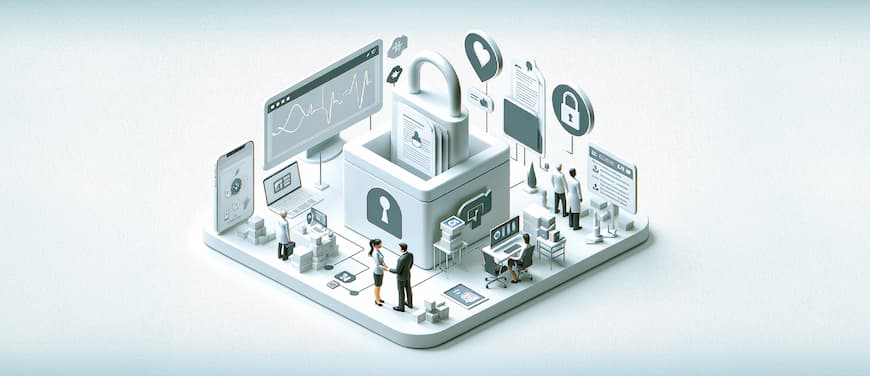Ensuring Patient Data Privacy
In the rapidly evolving landscape of healthcare, the need for seamless and secure file sharing has become paramount. As medical professionals and institutions embrace digital transformation, the sharing of patient data has become more prevalent, making it crucial to establish robust security measures to safeguard sensitive information. Let’s explore some of the challenges and solutions associated with secure file sharing in healthcare, with a primary focus on ensuring patient data privacy.
Challenges in Healthcare File Sharing

Strict Regulatory Compliance
Healthcare operates under a web of stringent regulations, such as the Health Insurance Portability and Accountability Act (HIPAA) in the United States. Compliance with these regulations is non-negotiable, and any lapse in data security can result in severe legal consequences. File sharing methods must align with these regulatory frameworks to maintain patient trust and legal integrity.
Diverse Stakeholders
Healthcare involves various stakeholders, including physicians, nurses, administrative staff, and external partners. Coordinating effective communication while ensuring data privacy among these diverse entities is a complex challenge. A secure file-sharing system must accommodate these different roles without compromising security.
Integration with Existing Systems
Many healthcare organizations use a variety of electronic health record (EHR) systems, and integrating secure file-sharing solutions seamlessly into these existing platforms is crucial. A lack of interoperability can lead to inefficiencies and potential security vulnerabilities.
Solutions for Secure File Sharing
End-to-End Encryption
Implementing end-to-end encryption is a fundamental step in securing file sharing. This ensures that data is encrypted from the sender’s device until it reaches the intended recipient, preventing unauthorized access during transit. This level of encryption is particularly critical when dealing with patient health records and sensitive medical information.
Role-Based Access Control (RBAC)
RBAC allows healthcare organizations to control access to files based on the roles and responsibilities of individual users. This ensures that only authorized personnel can access specific files, reducing the risk of data breaches caused by internal factors.
Audit Trails and Monitoring
To enhance transparency and accountability, implementing robust audit trails and monitoring systems is essential. These features track user activities, providing a detailed record of who accessed files, when, and for what purpose. Regularly reviewing these logs helps identify and mitigate potential security threats promptly.
Secure Collaboration Platforms
Utilizing secure collaboration platforms designed explicitly for healthcare can address the unique challenges faced by the industry. These platforms often come with built-in security features, compliance tools, and integrations with popular EHR systems.
User Training and Awareness
Human error remains a significant factor in data breaches. Conducting regular training sessions for healthcare staff on the importance of data security, best practices for file sharing, and recognizing phishing attempts can significantly reduce the risk of unintentional breaches.
How do I send HIPAA Compliant Documents?
To protect your company from HIPAA violations, it’s essential to find HIPAA-compliant file storage platforms.
- Dropbox for Business
- Box
- G Suite
- ShareVault
Secure file sharing in healthcare is not merely a technological requirement; it’s a moral and legal obligation to protect patient privacy. As the industry continues to digitize, healthcare organizations must prioritize robust security measures to maintain the trust of patients and comply with stringent regulations. Implementing end-to-end encryption, role-based access controls, audit trails, and user training are essential steps toward achieving secure file sharing and ensuring the privacy of patient data in the ever-evolving healthcare landscape.
About ShareVault
ShareVault virtual data rooms are used by healthcare organizations worldwide. It’s a data room solution equipped with the industry’s most advanced document-sharing capabilities and highly granular access control policies. Using ShareVault, health organizations can confidently share sensitive patient information and company data with payers, providers, patient care teams, and relevant stakeholders without compromising information security.







